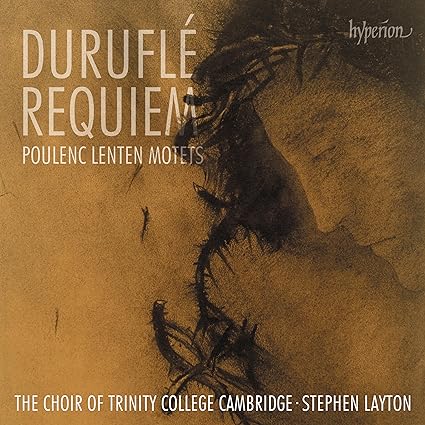

Maurice Duruflé: Requiem, Op. 9 (version for choir and organ - 1948) Francis Poulenc: Lenten Motets (1939)
French organist and composer Maurice Duruflé (1902-1986) stands as a solitary figure amongst 20th century composers. As an organist for over 45 years in the same catholic church, his music is very much permeated with tradition, and inherently influenced by Gregorian chant. And yet his harmonic language and formal structure protrude like a beacon over the century's musical landscape. He once stated that he was disconcerted by the direction music was taking during his lifetime, so it's easy to imagine what his reaction would be now. Surprisingly, he left behind only a small number of works, mostly for the organ, which all pushed the envelope to a certain extent. Although with a strong footing in the past, his music never quite ripped the envelope like Olivier Messiaen for example. For further insight on Duruflé's methodology, please read this previous review of a recent recording of his Complete Organ Works.
If you are at all familiar with the Requiem by Gabriel Fauré, you will find many similarities between the two as far as structure and liturgical texts are concerned. In fact, they are often presented together on recordings. But that is where the similarities end. Whereas Fauré's conception is more concerned with the peaceful afterlife, Maurice Duruflé's is much darker and foreboding in outlook, with some astonishingly powerful passages as in the Sanctus for example.
This new recording with the Choir of Trinity College Cambridge under the direction of Stephen Layton, captured within the cavernous interior of the Church of Saint-Eustache in Paris, convincingly projects the broad dynamic range of this work. When both the choir and pipe organ gradually swell and crescendo to a powerful climax, you can practically feel this devastating wave of sound rolling through the building. You feel as if sitting on a pew in the middle of the church, positioned in the sweet spot where all of the sonic splendour of the music reverberates off the stone walls and converges in the center.
It's final In Paradisum may not project the same vision of beatitude as in the Gabriel Fauré, but instead leaves you pondering the profound mysteries of life and the hereafter. In this recording, even the softest and quietest moments generate an unnerving sense of scope, time, and space, befitting the composer's intent.
Jean-Yves Duperron - March 2024 Requiem - Kyrie